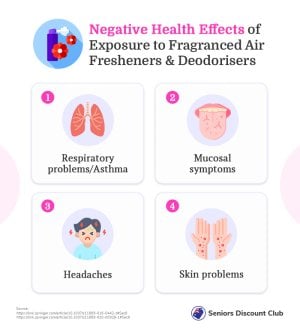Scientists warn that popular scented candles and diffusers may be damaging your health
- Replies 14
Who doesn’t love a nice-smelling home?
It’s not too much of a stretch to believe that the scent of one’s house says something about the occupant, and there's nothing better than lingering aromas of our favourite fragrances wafting around when we come home to sit back and relax after a long day.
But what if it turns out you’ve been breathing in toxic chemicals all along?
As the scented candle industry continues to boom in Australia — estimated to be around $117.3 million per year and growing — Deakin University Environmental Engineering Senior Lecturer Dr Svetlana Stevanovic has urged home fragrance lovers to heed her warning: potentially toxic chemicals are released into our homes when scents are used and may be causing negative health effects.
‘Candles and any scents that are being emitted...are associated with the emission of volatile organic compounds and also small particles that stay in the air,’ she said.
‘When we burn (candles), during the combustion process...we have a lot of little particulates that are being released and many of them are going directly to our lungs.'
‘It is well established that that is causing a range of different negative health effects.’

Volatile organic compounds (VOCs) refer to a wide array of organic substances that undergo chemical reactions when exposed to air and light.
She previously explained VOCs in a piece on The Conversation.
‘These are airborne chemicals that include wide classes of organic compounds: terpenes such as limonene (lemon scent), alpha-pinene (smell of pine trees), and beta-pinene; solvents such as ethanol, formaldehyde, benzene, toluene and xylene, and many other compounds,’ Dr Stevanovic said.
‘These VOCs will react with ozone and other indoor oxidants to generate a range of oxidation products, which are potentially toxic molecules. The level of exposure and concentration determines the potential toxicity.’
‘Fragrances and ozone can also generate pollutants such as formaldehyde, acetaldehyde and free radicals, all classified as toxic or hazardous by agencies such as the EPA.’
Some studies note the negative health effects of scented products, including respiratory problems and headaches.
Dr Stevanovic added that scented products may also trigger allergies.
‘Around one-third of our population is generally sensitive to these volatile organic compounds of scents,’ she said.
‘Once we emit something into the air it keeps changing, so it won’t even be the same as when we burn it — it will be oxidised, it will change ... and then it becomes even more toxic for us.’
The situation becomes worse when taking into account that indoors, air doesn’t move as freely, leading to higher concentrations of pollutants including VOCs.
‘Outside, you have wind, you have a lot of dilution, you have larger air mass, but inside the volume of air is small and we are not exchanging the air, we are basically just putting new pollutants into the air,’ she explained.
Unfortunately for those wanting to take a closer look at their home fragrance solutions like scented candles and aroma diffusers, it’s quite difficult to get into the nitty-gritty of what’s in the ingredients list.
According to Dr Stevanovic, manufacturers behind the products aren’t legally obligated to disclose ingredients as they are often cited as ‘trade secrets’.

What’s more, she said that businesses also tend to ‘greenwash’ their products by highlighting them as ‘natural’ and ‘organic’, even when it doesn’t mean that they are safer.
‘I do think we should have very strong regulations about what is green, what’s not green,’ said Stevanovic.
‘(Natural) doesn’t mean that if we inhale it all the time it’s good for us, so we should do everything in moderation.’ (Air is a vital exception to this rule though… Kidding!)

To mitigate any negative effects associated with the use of scented products, Dr Stevanovic advises always keeping the air flowing indoors — and going green.
‘(Open) the window or a door (and) surround (yourself) with greenery — plants are excellent air cleaners,’ she said.

But while experts like Dr Stevanovic are convinced of the harmful effects of scented products, others see no cause for concern.
In a 2019 New York Times article, a respiratory toxicologist said that scented candles in particular give off so few chemicals that they don’t pose a significant risk to human health.
Well, while it seems like the jury’s still out on this matter, a little caution never hurts, especially where our health is concerned.
So, what are your thoughts on this warning from Dr Stevanovic? Are you concerned that items like scented candles could end up harming you in the long run?
Tell us in the comments section below!
It’s not too much of a stretch to believe that the scent of one’s house says something about the occupant, and there's nothing better than lingering aromas of our favourite fragrances wafting around when we come home to sit back and relax after a long day.
But what if it turns out you’ve been breathing in toxic chemicals all along?
As the scented candle industry continues to boom in Australia — estimated to be around $117.3 million per year and growing — Deakin University Environmental Engineering Senior Lecturer Dr Svetlana Stevanovic has urged home fragrance lovers to heed her warning: potentially toxic chemicals are released into our homes when scents are used and may be causing negative health effects.
‘Candles and any scents that are being emitted...are associated with the emission of volatile organic compounds and also small particles that stay in the air,’ she said.
‘When we burn (candles), during the combustion process...we have a lot of little particulates that are being released and many of them are going directly to our lungs.'
‘It is well established that that is causing a range of different negative health effects.’

Scented candles are a fixture in some homes meant to give off aromatic fragrances. Image Credit: Pixabay
Volatile organic compounds (VOCs) refer to a wide array of organic substances that undergo chemical reactions when exposed to air and light.
She previously explained VOCs in a piece on The Conversation.
‘These are airborne chemicals that include wide classes of organic compounds: terpenes such as limonene (lemon scent), alpha-pinene (smell of pine trees), and beta-pinene; solvents such as ethanol, formaldehyde, benzene, toluene and xylene, and many other compounds,’ Dr Stevanovic said.
‘These VOCs will react with ozone and other indoor oxidants to generate a range of oxidation products, which are potentially toxic molecules. The level of exposure and concentration determines the potential toxicity.’
‘Fragrances and ozone can also generate pollutants such as formaldehyde, acetaldehyde and free radicals, all classified as toxic or hazardous by agencies such as the EPA.’
Some studies note the negative health effects of scented products, including respiratory problems and headaches.
Dr Stevanovic added that scented products may also trigger allergies.
‘Around one-third of our population is generally sensitive to these volatile organic compounds of scents,’ she said.
‘Once we emit something into the air it keeps changing, so it won’t even be the same as when we burn it — it will be oxidised, it will change ... and then it becomes even more toxic for us.’
The situation becomes worse when taking into account that indoors, air doesn’t move as freely, leading to higher concentrations of pollutants including VOCs.
‘Outside, you have wind, you have a lot of dilution, you have larger air mass, but inside the volume of air is small and we are not exchanging the air, we are basically just putting new pollutants into the air,’ she explained.
Unfortunately for those wanting to take a closer look at their home fragrance solutions like scented candles and aroma diffusers, it’s quite difficult to get into the nitty-gritty of what’s in the ingredients list.
According to Dr Stevanovic, manufacturers behind the products aren’t legally obligated to disclose ingredients as they are often cited as ‘trade secrets’.

Fresh outdoor air gives pollutants and VOCs less chance to accumulate, unlike indoors. Image Credit: Flickr
What’s more, she said that businesses also tend to ‘greenwash’ their products by highlighting them as ‘natural’ and ‘organic’, even when it doesn’t mean that they are safer.
‘I do think we should have very strong regulations about what is green, what’s not green,’ said Stevanovic.
‘(Natural) doesn’t mean that if we inhale it all the time it’s good for us, so we should do everything in moderation.’ (Air is a vital exception to this rule though… Kidding!)
Key Takeaways
- Environmental Engineering expert Dr Svetlana Stevanovic is warning fragrance-lovers about the amount of potentially toxic chemicals released into their homes when aromatic products like scented candles are used.
- Prolonged exposure to pollutants emitted from home scents is associated with negative health effects, such as headaches and allergic reactions.
- Candle and scent manufacturers are not obligated to disclose all of the compounds used in products.
- To avoid any negative health impacts, it is important that inside spaces are kept well-ventilated and scents should be used in moderation.
- Other experts though have noted previously that fragrant products like scented candles pose no risk to human health.
‘(Open) the window or a door (and) surround (yourself) with greenery — plants are excellent air cleaners,’ she said.

One-fifth of respondents in a 2016 study reported feeling side-effects from exposure to fragranced air fresheners and deodorisers. Image Credit: Seniors Discount Club
But while experts like Dr Stevanovic are convinced of the harmful effects of scented products, others see no cause for concern.
In a 2019 New York Times article, a respiratory toxicologist said that scented candles in particular give off so few chemicals that they don’t pose a significant risk to human health.
Well, while it seems like the jury’s still out on this matter, a little caution never hurts, especially where our health is concerned.
So, what are your thoughts on this warning from Dr Stevanovic? Are you concerned that items like scented candles could end up harming you in the long run?
Tell us in the comments section below!







